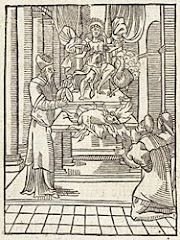This has illustrations, photos, and a couple of papers to read.
http://webpage. pace.edu/ nreagin/F2005WS2 67/AmyChing/ Stepmother. html
Theoi.com is great for all Greek religio-mythic research.
http://www.theoi. com/Olympios/ Hera.html
A student-friendly site:
http://students. ou.edu/G/ Lindsay.J. Grimm-1/intro. html
Not much new or different, but a good group to check out online:
http://www.neokoroi .org/gods. htm
Look for the Etruscan Uni - pictures and text available.
Also note that the etruscan script is very much like what the magic & witch books call "Theban alphabet".
http://www.mysterio usetruscans. com/
This site explores Etruscan/Greek myth commonalities, and has illistrations that include the Etruscan Thetis:
http://www.maravot. com/Translation_ ShortScripts_ c.html
A site for Thetis!
http://www.mlahanas .de/Greeks/ Mythology/ Thetis.html
Iliad site:
http://www.uark. edu/campus- resources/ achilles/ iliad/iliad. html
Calendar - origin of June?
http://www.wordinfo .info/words/ index/info/ view_unit/ 3193/?letter= a&page=1& spage=1&s= past
A wonderful site loaded with images from rthe Classical world.
Scroll down the list 0 it is worth it!
http://www.vroma. org/images/ mcmanus_images/ index10.html
This ceramic head has a few chips missing but retains nice portraiture. Note the crown/diadem with flowers:
http://www.vroma. org/images/ mcmanus_images/ juno_scasato. jpg
Juno Moneta, patroness of money, finance, teh mint, etc.:
http://www.britishm useum.org/ explore/highligh ts/highlight_ objects/cm/ s/silver_ denarius_ showing_juno_ m.aspx
Photos of coins with Juno on them - some obverse, others reverse.
http://www.aeqvitas .com/photo. php?freeform= sid
This is the last item for today, tying in to the full moon on wednesday, which is also the last lunar eclipse of the year:
"FEASTS AND RITUALS FOR HERA
In honor of the three phases of Hera, the ancient residents of Greece celebrated the Heraea, a competitive festival that dates to earlier times than the Olympics. Every four years - and later, on the full moon of August, every year - women came to a field near Hera's town of Argos for the 160 yard races. They ran bare-breasted and with hair unbound, in three age groups to honor the goddess' s three stages. There were three winners, each receiving identical olive crowns and a share in the cow sacrificed at the festival. Each winner had the right to leave a statuette of herself in Hera's shrine.
Hera's other great festival was her annual. Her worshipers bathed her image, renewing her youth and preparing her again for the seasonal cycle of vegetative maturation and death. Carrying the goddess's statue to the water to cleanse the winter from her marked how they, like the earth, would forever be reborn. Unfortunately, the date for his ritual has been lost, although it would make symbolic sense if the renewal celebration were held in spring. As goddess of women, Hera could be appropriately invoked today on International Women's Day, March 8th. " excerpt from:
http://www.orderwhi temoon.org/ goddess/Hera. html
There's plenty here to use for research and better comprehension of some of the many facets this powerful goddess exhibits.
Be well and Buona notte,
Demetria
Subscribe to:
Post Comments (Atom)


No comments:
Post a Comment